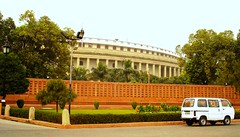The Indian Parliament erupted in hoots and jeers Thursday after a draft report by government auditors estimated that the national treasury lost $210 billion by selling coal fields to private excavation companies in sweetheart deals.
According to the report, leaked to the Times of India newspaper, the primary beneficiaries were about 100 private and state companies that were handed contracts for 155 coal fields between 2004 and 2009 without going through a competitive bidding process. The report said that $210 billion — five times India’s annual defence budget — was a conservative estimate given that it relied on prices for low-grade rather than medium-grade coal.
The report represents the latest in a string of corruption scandals to hit the ruling Congress Party — others have involved the telecommunications, real estate and sports industries — that has left India’s leadership weak and bereft of policy initiatives. Opposition leaders called the latest revelation the “mother of all scams,” accusing the government of looting the country.
But auditors with the comptroller/auditor general’s office countered that the leaked draft is misleading, adding in a letter to the prime minister’s office that the figures publicized were the product of discussions held at a “very preliminary stage.
“We are examining the news report and I have called for records,” Coal Minister Sriprakash Jaiswal told journalists, adding that he wasn’t in office at the time of the suspect deals. “After that I will reply.”
The government said it has not received the report yet from comptroller/auditor general’s office.
India, the world’s third-largest coal producer after China and the United States, has seen a series of mining scandals. In August, the top elected official in south western Karnataka state resigned after being implicated in a mining scandal that a watchdog said involved $400 million. Three months later, a report claimed that almost 50% of the iron ore exported from western Goa state was illegally mined.
India is hungry for energy to fuel its fast-growing economy, and coal accounts for 70% of the mix, a percentage expected to grow, given limitations on the further development of power from nuclear reactors and renewable sources. Environmentalists, however, say increased production is ecologically unsustainable.
